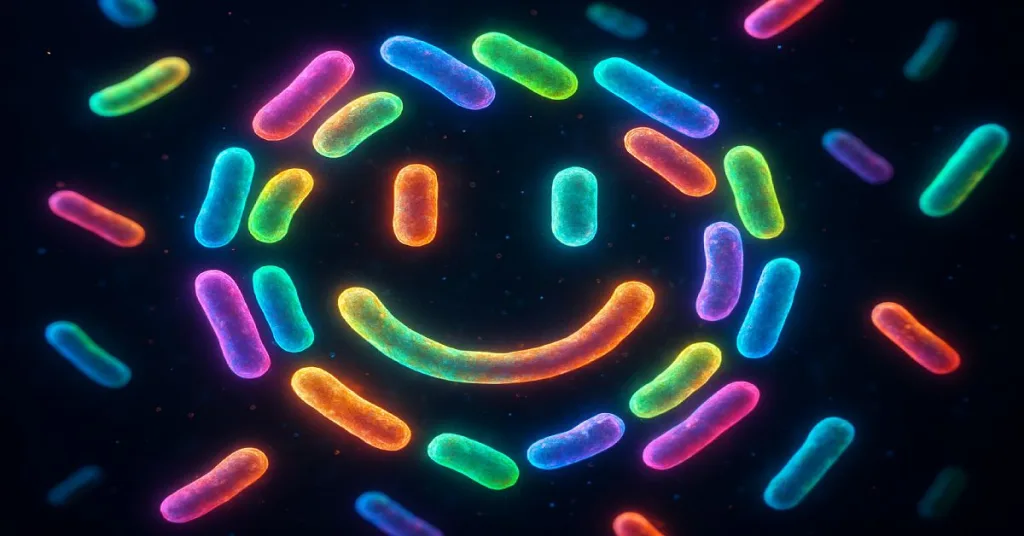The Gut-Brain Buzz
Think about the last time you had a knot in your stomach before a big meeting, or butterflies before a date. That wasn’t just nerves — it was your gut and brain talking. Scientists call this two-way chat the gut-brain axis, and it’s why researchers now say your mental health may depend as much on your microbiome as on your therapist.
Enter psychobiotics — probiotics and prebiotics that don’t just help digestion, but also influence mood, anxiety, and stress. It sounds almost too good to be true: tiny bacteria in your gut that can help you feel calmer, happier, and more focused. But here’s the kicker — the science is catching up, and supplement companies are racing to turn it into the next big thing.
Why Psychobiotics Are Blowing Up
The wellness world loves a trend, but this isn’t just hype. Over the past decade, researchers have discovered that:
- 95% of the body’s serotonin (the “feel-good” chemical) is made in the gut.
- Certain bacteria actually produce neurotransmitters like GABA and dopamine.
- Gut microbes can dial down cortisol, the stress hormone, when balanced correctly.
- And in clinical trials, people who took specific probiotic strains reported lower anxiety, better sleep, and improved mood.
Translation? Your gut bacteria aren’t just digesting your lunch — they’re acting like miniature pharmacists, pumping out brain chemicals and stress regulators.
The Science Without the Snooze
Psychobiotics work through a few main channels:
- Neurotransmitter factories: Some strains produce compounds that act directly on the brain. For example, Lactobacillus rhamnosus has been linked to increased GABA activity — the same calming pathway targeted by anti-anxiety drugs.
- Inflammation control: An unhappy gut leaks inflammatory molecules into the bloodstream, which can mess with mood and energy. Psychobiotics help reinforce the gut wall, reducing that “leaky gut” effect.
- Stress reset: Several studies show probiotic supplementation lowers cortisol, the hormone that keeps you locked in “fight or flight” mode.
- Brain growth factors: Early evidence shows certain strains boost BDNF (Brain-Derived Neurotrophic Factor), a key player in learning, resilience, and recovery from depression.
None of this means you can ditch therapy or medication if you need them. But it does mean your daily yogurt may not be pulling its weight compared to a psychobiotic formula.
Which Strains Actually Matter?
Not all probiotics are created equal. If the label just says “probiotic blend” without listing strains, skip it. The research points again and again to a handful of stars:
- Lactobacillus helveticus + Bifidobacterium longum: this duo reduced anxiety and improved mood in human trials.
- Lactobacillus plantarum: linked to better stress resilience.
- Bifidobacterium breve: studied for both cognition and stress regulation.
- Lactobacillus rhamnosus: famous for its effect on GABA and calming pathways.
These aren’t magic bullets — effects are modest, and not everyone responds the same. But if you’re shopping for mood-supporting probiotics, these are the strains to look for.

Industry Watch: Legere Pharmaceuticals Steps In
When smaller supplement brands jump on a trend, it’s one thing. But when Legere Pharmaceuticals — a pharmaceutical-grade supplement manufacturer — labels psychobiotics “the new Prozac,” you know it’s going mainstream.
Legere already offers digestive products combining probiotics with enzymes and botanicals, and their 2025 trend report made it clear: gut-brain health is the next billion-dollar category. If big players are investing in R&D, it means you’ll soon see psychobiotics everywhere — from capsule blends to functional foods.
That’s good news for consumers… as long as you know what to look for and don’t get fooled by marketing fluff.
How to Pick a Psychobiotic That’s Worth Your Money
Here’s where people screw up: they grab the first probiotic bottle with a shiny “mood support” label. But to avoid wasting cash, stick to these rules:
- Demand strain names. “Lactobacillus” isn’t enough. You want the full ID, like L. helveticus R0052 or B. longum 1714.
- Check CFUs. Clinical trials usually use billions of CFUs (colony-forming units). Anything under a billion is unlikely to move the needle.
- Look for multi-strain blends. Evidence suggests combinations outperform single strains.
- Pair with prebiotics. Fiber feeds your psychobiotics. No fuel, no mood boost.
- Stick with it. Studies show effects after 2–8 weeks. Don’t expect overnight bliss.

The Limitations (And Why That’s Okay)
A reality check: psychobiotics aren’t magic pills. They don’t “cure” depression, they’re not a substitute for therapy, and they’re not going to turn you into a Zen monk after one dose.
What they do offer is a gentle, biological nudge — a way to support mood and stress resilience from the gut outward. For some, that’s life-changing. For others, it’s subtle but noticeable. And in the supplement world, subtle + safe is often exactly what you want.
A Note on Safety
Most people tolerate probiotics well. But if you’re immunocompromised, have major gut issues, or are on medications, talk to a professional first. Start low, monitor how you feel, and remember: supplements work best when diet, sleep, and lifestyle aren’t a disaster.
Bottom Line
Psychobiotics aren’t just another probiotic fad. They’re one of the first supplement categories to bridge hard neuroscience with everyday wellness, and the research is strong enough to take seriously.
The gut-brain axis is real. The strains are real. And companies like Legere are betting the farm on them. If you’ve ever wished your probiotics did more than “support digestion,” now’s the time to pay attention.
see also: Cocoa Flavanols & Stem Cells: The Sweet Truth Behind the Hype